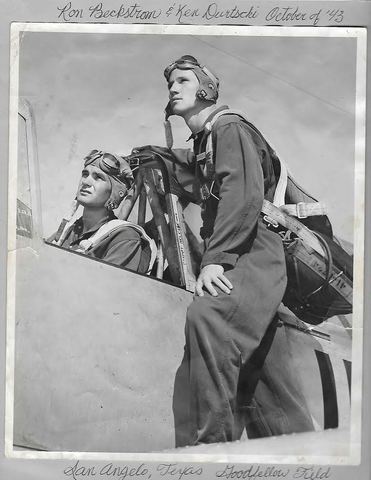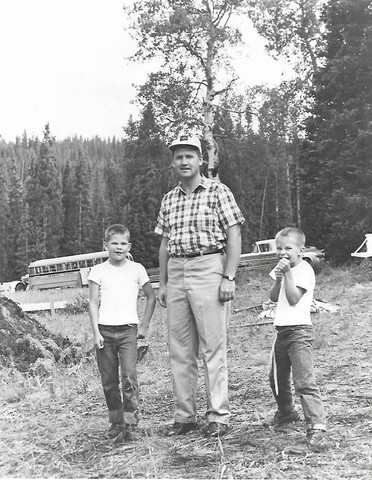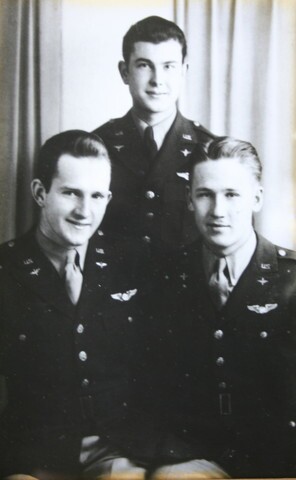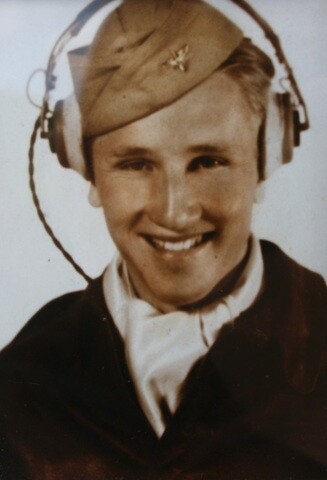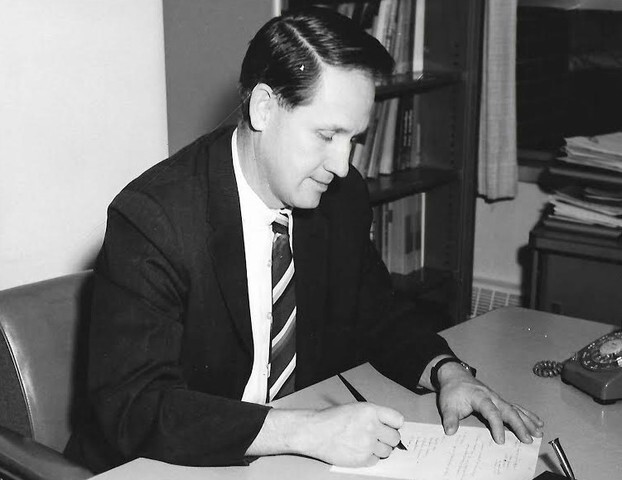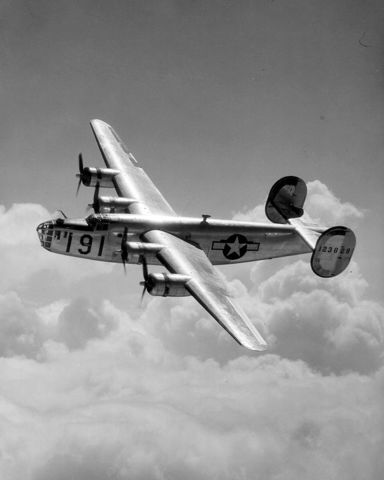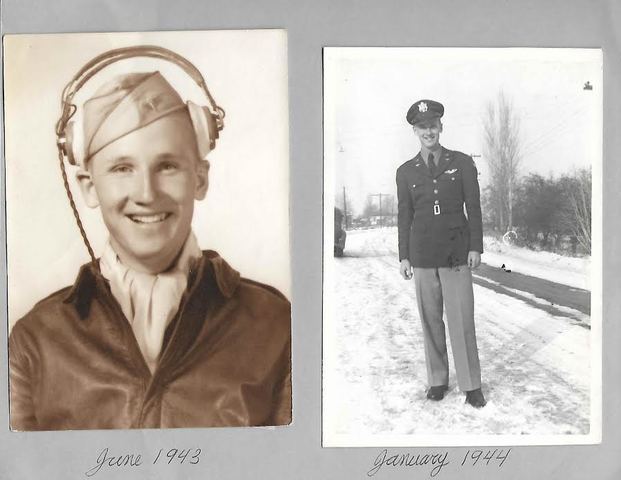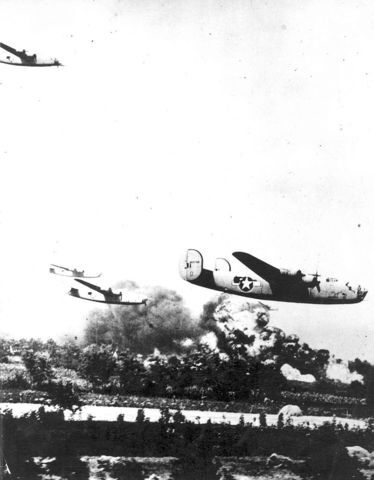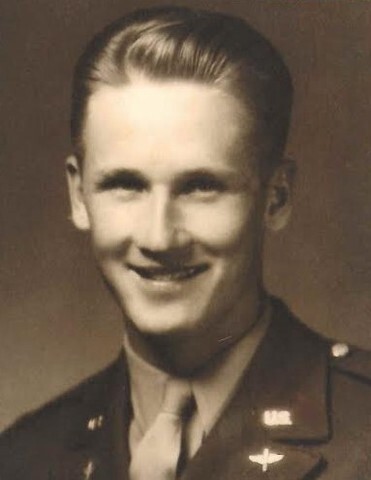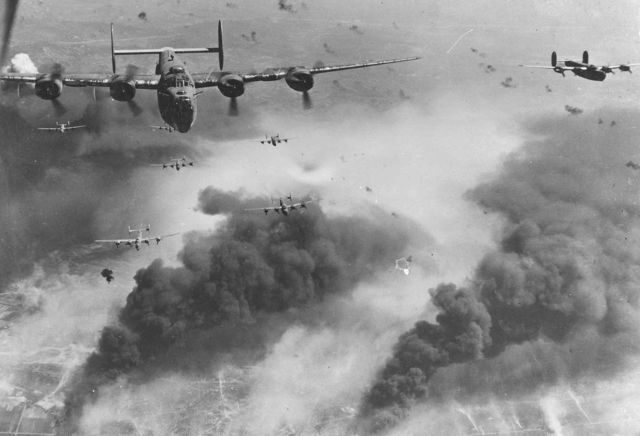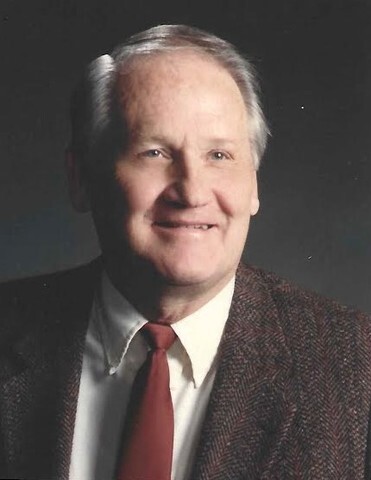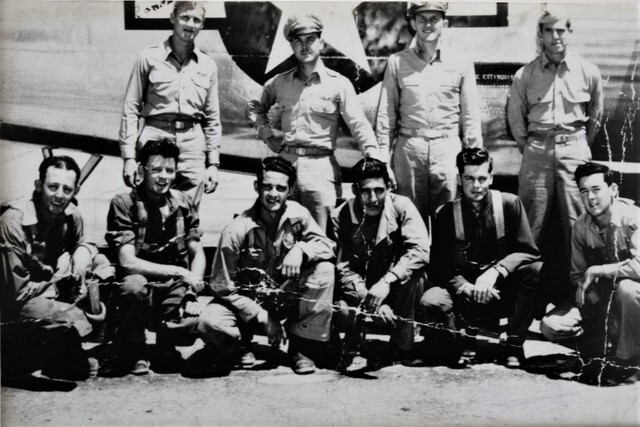During WWII, one American bomber pilot single-handedly saved the lives of 90 men by listening to the promptings of the Spirit. That pilot was my grandfather, Ronald S Beckstrom.
“And upon the wings of his Spirit hath my body been carried away upon exceedingly high mountains. And mine eyes have beheld great things, yea, even too great for man” —Nephi 4:25
It was the worst possible weather—cloudless azure skies stretching high above the Ruhr Valley in northwestern Germany.

Another shell exploded, causing the B-24 bomber to shudder erratically as Ronald S Beckstrom—Beck to his crew—gripped the yoke. Despite the layers of nylon and wool underwear covered by an electrically heated flight suit, he was bitterly cold as his plane descended over one of the most heavily defended areas in Nazi Germany.
The radio operator scrambled over the catwalk, placing his foot on the bomb bay switch override to keep the doors open while the plane pitched and shook. A flak shell screamed through the open bomb bay door, striking one of the 2,000-pound bombs in the hold before exploding.
Miraculously, the explosion didn’t detonate the 8,000-pound bomb load, but it did scar the radio operator. During the commotion, Mosher, the copilot, dropped his navigational dividers. As he bent over to pick up the instrument, a shell exploded along the plane’s front, tearing a hole three feet in diameter through the nose to the place where Mosher had been sitting moments before. Northrup, the bombardier, scrambled to set his bombsights as the plane approached its target.
The barrage of flak and antiaircraft fire filling the sky with streaks of smoke and shrapnel frightened Garza, the ball turret gunner, who climbed from his position seconds before an exploding shell swept the whole ball turret away. Another antiaircraft shell bounced off one of the four bombs in the plane’s gaping body. A piece of shrapnel struck Garza, almost severing his arm, which remained attached by a piece of skin and muscle the size of a thumb.
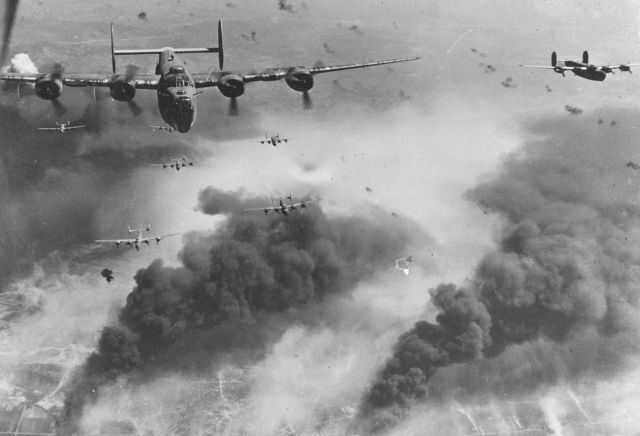
Hundreds of bombers scattered across the sky dropped their loads, the falling bombs looking like silver rain. Someone tried to stem the blood gushing from Garza’s arm as the plane turned and puttered the 350-mile trip back to the base near Norwich, England.
At the base, medical surgeons reattached Garza’s arm, but he would never fly again. More than 300 bullet holes mutilated the bomber, and one of the flight control cables was nearly severed. The plane was immediately deemed unflyable.
“Several reasons existed to bring us down, but none of them succeeded, thank the Lord!” Beck wrote in his autobiography.
It wasn’t until after the war that Beck learned his mother had lain awake that night, unable to sleep as she thought of her son who was being shot at half a world away. Her thoughts drew her to her knees.
After a desperate prayer, her mind finally quieted, allowing her to sleep. “Her prayer undoubtedly contributed to our survival,” Beck wrote. In fact, he remembers feeling an inexplicable peace during the harrowing mission.
Every day during the war, Beck was keenly aware of the miracles that preserved his life.
Surrounded by War
War was inescapable during Beck’s senior year of high school. Hitler had just violated his pact with the Soviet Union, and the Japanese killed nearly 2,500 Americans in their surprise attack on Pearl Harbor. By the fall of 1942, Beck had enlisted and was accepted as a cadet in the Army Air Corps.
While waiting for his first post, he received his patriarchal blessing, in which, according to his daughter Rolayne Hanson, “he was promised that he would enjoy blessings of health and safety if he followed the Spirit”—a promise that became incredibly prophetic during and long after his service as a pilot.
On January 7, 1944, at 19 years old, Beck got his wings. At the age many Latter-day Saint young men and women now prepare to serve a mission for their church, Beck flew 35 missions for his country in an aircraft poetically named the B-24 Liberator. These hulking planes were difficult to steer, and mechanical issues initially made some of them burst into flames or lose their tails mid-flight. Consequently, the crews who first flew the 71,200-pound, flat-faced aircraft cynically—or maybe realistically—dubbed it “the flying brick,” “the constipated lumberer,” and “the flying coffin.” But the B-24 could fly all day without refueling, allowing the Allies to penetrate deeper into enemy territory.
When he first arrived at the base of the 458th Bomb Group in Horsham St. Faith near Norwich, England, Beck felt uneasy and out of place after being given the room of a pilot who had died only hours before.
The man’s belongings still decorated the room—a testament to the fact that Beck had only a 50 percent chance of surviving the war. That statistic dropped to 40 percent as the war escalated. But Beck stood out from the rest of the men in his unit.
Wings of the Spirit
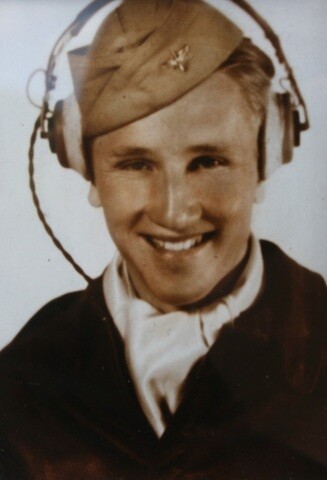
“The word integrity comes to mind whenever I think of my dad,” Rolayne shares. “He showed absolute faith in following the Savior and living a righteous life. He was steadfast and immovable.”
Beck would save in a bottle the shot of celebratory whiskey he received after each flight, giving it to his crew to enjoy at Christmas. He also gave his cigarette rations to the plane mechanics, who in turn ensured that his plane was always well maintained.
Beck’s ability to keep and follow the Spirit saved not only his own life and his crew’s lives on multiple missions but also saved the lives of nearly 100 men.
On one occasion, Beck was flying as the lead plane of a squadron. When the main group began turning left, Beck received a particularly powerful warning from the Spirit. Though it went against his training, he turned right, away from the group, and his entire squadron dutifully followed.
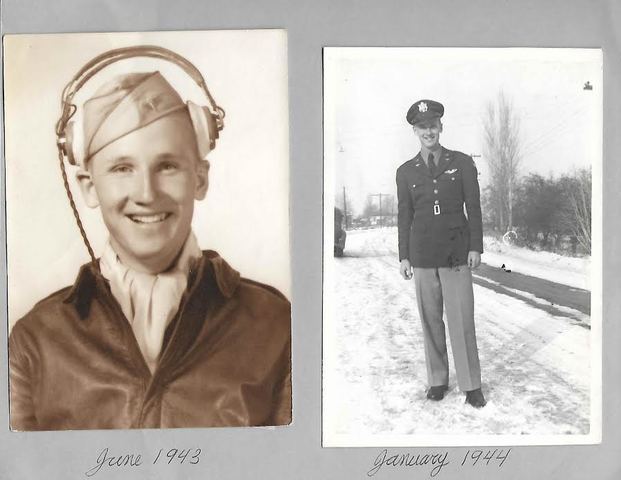
Within moments, the sky to the left of his B-24 filled with curls of smoke, chunks of shrapnel, and clouds of flak so thick the sky looked like charcoal—a barrage his entire squadron would have been caught in had he not followed the Spirit’s warning.
During debriefing at the base, the group commander estimated that Beck’s maneuver had saved nine crews—a total of 90 men. When asked how he had known to avoid the flak, all Beck could say was, “I had a feeling to move differently.” After that, the group commander told Beck to be sure to follow his feelings.
Missing in Action

While battling strong jet-stream winds, Beck was blown off course and didn’t have enough fuel to make it back to his base. Luckily, he remembered a base in Lille, France, from his “gasoline hauling days” and was able to give the right I.D. code to get past the Typhoon fighters protecting the base. Once on the ground, the British officials refused to provide Beck or his crew with food or blankets since they didn’t have “official authorization” to be at the base.
Despite the war-time shortages, the crew managed to find some lodging and food in town, but the next morning they were picked up by the American military police and grilled for four hours as being possible deserters. Even after proving their innocence, the crew still had to transfer to an American base to refuel and wait for approval to return to their home base in England in a bomber deemed un-flyable. It took six days, and by the time Beck reached his base, a G.I. was packing his clothes and belongings to send home as the crew had been labeled “missing in action.”
In the Midst of Combat
Whether packing up the belongings of a friend and fellow pilot who would not be returning home or drawing blackout shades tightly over the windows at night, traces of the war filled every moment of Beck’s time in Europe.
But nowhere was the reality of the war more pressing than when in the air.
Beck completed two missions over the Battle of the Bulge, flew through hurricanes and violent thunderheads that warped airplane wings, and was knocked out of formation 14 times, causing him to struggle to his base “all alone, shot up, but happy.”
In March 1945, while he was flying over a target near Hanover, Germany, in order to improve the accuracy of their bombers, Beck’s mission required them to fly a mere 3,500 feet above the ground instead of the usual 23,000 feet. The planes were assaulted by flak and 88mm guns that brought down six bombers in the first few seconds of the barrage, including one flown by Beck’s good friend.
During the attack, “we had an engine knocked out, and I had to shut down another one because it was throwing sheets of oil from a hit,” Beck wrote. This left the crew in a precarious position.
B-24 bombers were notorious for being unstable and crashing easily if one or two of their engines went out. While the rest of the group climbed back to a high altitude to avoid approaching a heavily fortified battery of antiaircraft guns, Beck’s only choice was to “fly directly over the city and hope the Germans were low on ammunition and wouldn’t bother shooting at one crippled airplane.”
After making it over Germany, however, Beck began to lose a third engine over the North Sea, which had a water temperature of 34 degrees. If the plane crashed in the water, his crew would last less than five minutes.
At an altitude of only 500 feet, Beck finally reached the English coast, but his plane was still losing altitude. In an emergency landing, he reached Norwich with only one engine functioning. “I got the Distinguished Flying Cross for this one,” he wrote.
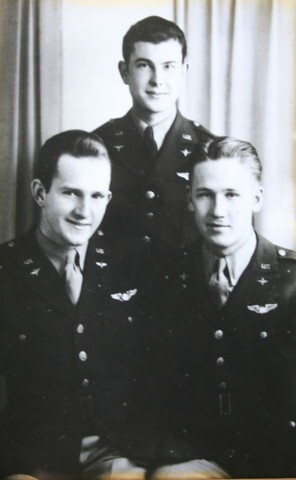
While miracles, the Spirit, skill, countless prayers, and even dumb luck helped Beck survive the war, he had no doubt that it was his Heavenly Father and Savior who saved his life in more ways than one—then and forever.
Life After War
After finishing his 35th mission in March 1945, Beck’s crew threw him a surprise banquet at a local hotel, thanking him for getting them through the war alive. “Each crew member bore his testimony regarding my skills and not drinking alcohol. They believed they made it through the missions because of me. I wish I had a recording of all that was said,” Beck wrote.
“He never took credit for his daring and amazing missions,” his grandson Nolan Hanson remembers. “The thing that stands out to me the most when he told [stories about the war] was the respect he had for his crew and those men who had paid the ultimate price sacrificing themselves for their men and their country.”
Back in Utah, Beck soon reacquainted himself with a beautiful young woman named Jean Porter—whom he’d corresponded with during the war—and the two were married in the Salt Lake Temple on September 5, 1945. Together, they raised nine children.
Beck was offered a high-paying job with an airline company, but he turned down the offer to find a career that would allow him to spend more time with his future family.
A man with a “Wikipedia-like mind,” as his daughter Patricia Griffith describes him, Beck had a quest for knowledge that led him to receive a Bachelor of Science, a Master of Educational Administration, and a Doctorate in Education. Throughout his higher education, Beck worked as a teacher and later an administrator to support his family, juggling his career with family and church service.

Despite all that filled his life, Beck always devoted all he could to the church, serving as a bishop for many years, a stake counselor, and a stake patriarch. As a bishop, he found the time to help oversee, organize, and donate free labor to build two new church houses and one new stake center in his area.
“I remember going with my dad and my brothers to the new stake center many times,” Patricia says. “The day they poured cement for the sidewalks at the stake center, the sky was dark with rain clouds threatening overhead. My dad had fervently prayed that it wouldn't rain at the stake center which would ruin the cement. It was raining two blocks to the north, east, south, and west, but it never rained at the stake center that day.”
Leaving a Legacy of Faith
“Though he’s not physically present on earth, I feel his presence every day, as I do my mom’s, Jean,” Rolayne shares. “I know they are involved in the lives of their children, grandchildren, great-grandchildren.”
To his family, Beck’s war stories were “always part of his legend, . . . larger-than-life visions of heroics and humility,” his grandson Jeremy Peterson says.
When Ronald S Beckstrom passed away on March 27, 2006, his family lost a hero.
“I heavily relied on his knowledge of Church doctrine—he was ‘Mormon doctrine in the flesh’ in those days. I miss not being able to call him and discuss questions and concerns,” Patricia says.
Beck left an unforgettable legacy for his family.
“I've read his biography twice in the last few years and find myself in awe, tears stinging my eyes as I read and feeling so much love and appreciation for grandpa,” his grandson Craig Peterson says.
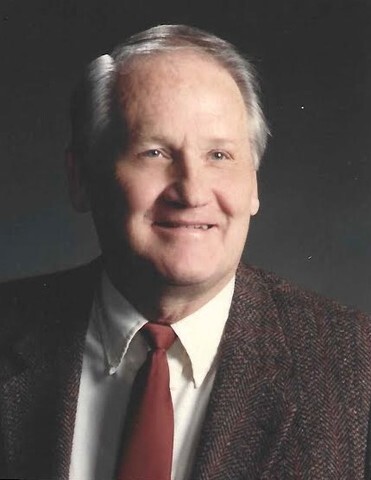
“I think his greatest accomplishment was all of us,” Jeremy says. While his war heroics, career achievements, and even his life-long love and work establishing a science camp for students in the Uintah mountains—Mill Hollow—impacted thousands, his greatest success was his family.
“I really miss his sense of humor, but my favorite thing about him is the fact that he is still such a big part of my life 11 years later,” grandson Steve Hanson says. “I keep a laminated copy of his obituary on my dresser, and I think before I start the day, ‘I hope I can make him proud today.’”
A granddaughter, Brittani Hale, adds, “[His faith] was unchanging, and that was amazing to me growing up; when so many people were constantly changing their minds and lifestyles, his faith remained unchanged. He loved the Church and what it stood for. He was an example to his family of faith—how to live it and how to make it your own.”
While it’s hard to sum up such a life, a quote Beck's daughter Mary Bailey shared at his funeral captures his legacy best, "If I have seen a little further it is by standing on the shoulders of giants."
“And I will bear him up as on eagles’ wings; and he shall beget glory and honor to himself and unto my name” —Doctrine and Covenants 124:18
